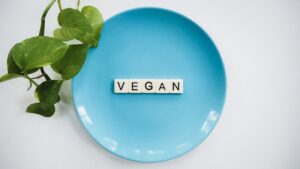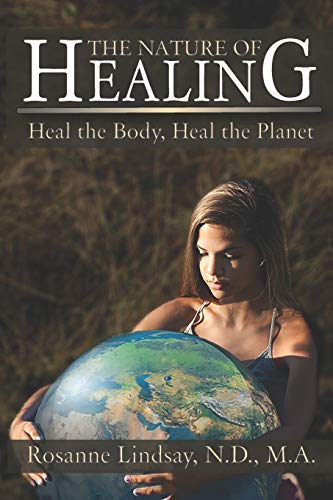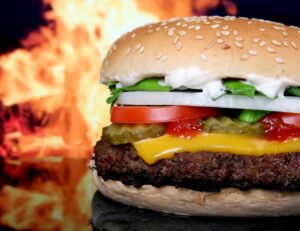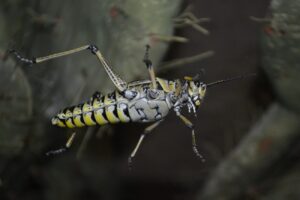 By Rosanne Lindsay, Naturopath
By Rosanne Lindsay, Naturopath
“There are three kinds of lies: lies, damned lies, and statistics.” – Mark Twain
Human beings are part of a long history of meat-eaters in the evolutionary chain, stretching back millions of years. Human physiology and brain development have been shaped by an omnivorous diet. There’s nothing wrong with the way humans evolved to eat meat, so long as it’s done with intention. For, we may need to understand the arguments that brought us to these “fake meat” crossroads.
The “experts” tell us that the global production of meat will need to double by 2050 to feed our growing population. Their solution? Trade beef burgers for soy-based burgers; fake meat.
But are they correct in their projections? According to several sources, the population is not expanding, but collapsing, both in the U.S., and throughout the world. High mortality rates combined with low birth rates will do that. [See The Overpopulation Myth]. If the “experts” are wrong about population statistics, could they be wrong about other conclusions?
Only 5 short years ago, the idea of fake meat was repulsive to real people. But let’s start with plant-based diets:
 Popular plant-based diets include:
Popular plant-based diets include:
- a vegetarian diet, which includes no meat
- a vegan diet, a type of vegetarian diet that excludes not just meat but also animal products, such as milk, eggs, and honey.
- a pescatarian diet, which is largely vegetarian but also includes seafood.
A 2019 Op-Ed in The Wall Street Journal criticized plant-based meats as highly processed and no healthier than meat. Its headline: “‘Plant-Based Meat’ Is All Hat and No Cattle.” The author asked, what if the alt-meat industry turns out to be a nothingburger?
In 2019, the alt-meat industry promoted their version of plant-based, lab-created burgers as “planet friendly.” However, in 2019, advertisers had to deal with real opposition. One consumer website compared fake meat to dog food. Why? Because the founder of Impossible Foods said he used to eat dog food. By choice.
Were naysayers of fake meat running disinformation campaigns or warnings to people who still had some common sense?
Today, due to widespread censorship, a healthy debate, like a healthy diet, is hard to find. Companies, such as Impossible Foods, Beyond Meat, and Unreal Deli, claim their marketing strategies have convinced consumers that fake meat is healthier and good for the planet. But, are they hiding something behind their glitzy ads? Is it Impossible to be healthy with their Beyond Unreal foods?
 The Nature of Healing: Heal the Body, Heal the Planet
The Nature of Healing: Heal the Body, Heal the Planet
by Rosanne Lindsay, N.D., M.A.
In their proclamations, why do they hide the true diet of commercial livestock? That is; a diet of candy, baked waste, potato waste, cottonseed, starch, and pasta, when the cow is meant to eat grass? What about the proven connection between farm chemicals and neurodegenerative diseases such as Parkinson’s and Alzheimer’s? [American Journal of Epidemiology. 169 (8): 919)].
Perhaps the term, diet (note the word “die” is in it), has led people to identify with a label without understanding the consequences. What happened to the understanding that We are what we eat?
Is Red Meat The Villain?
 In 2019, a review of 61 studies published in the Annals of Internal Medicine all came to the same conclusion: Decreasing red meat consumption had little to no effect on reducing risk of cardiovascular disease, cancer, stroke, or all cause mortality.
In 2019, a review of 61 studies published in the Annals of Internal Medicine all came to the same conclusion: Decreasing red meat consumption had little to no effect on reducing risk of cardiovascular disease, cancer, stroke, or all cause mortality.
But the food industry’s bottom line does not account for the conclusions of medical journals. Nor it is accountable for health outcomes. The science of Big Food relies on survey-based observational studies. Surveys track a person’s eating habits or past eating habits, based on a series of questions and calorie counting. Such research is less than honest. For honesty in journalism, you must return to 2019.
According to a 2019 USA Today Op-Ed piece by Will Coggin, perception is everything:
A lean beef burger has an average of nearly 20% fewer calories and 80% less sodium than the two most popular fake-meat burgers, the Impossible Burger and the Beyond Burger.
Fake meat is also an “ultra-processed” food, filled with unpronounceable ingredients. The National Institutes of Health released a study in May finding that ultra-processed foods cause weight gain. Unlike observational studies, this research was a controlled, randomized study.
Despite what critics say, even if everyone in America went vegan overnight, total greenhouse gas emissions (GHG) in the United States would only be reduced 2.6%.
Why do fake meat scientists attempt to convince people that real meat will harm the planet?
Will Coggin also reported that meat production is a minor contributor to our overall GHG levels. In fact, buried under the hot air of fake meat claims is a report that sets the record straight. The report showed that while animal farming doubled since the 1960s, Green House Gas shrunk by 11.3%. The conclusion? Don’t go vegan to save the planet. You can help by being a better meat-eater.
Where have all the contrary opinions gone today? Do meatless environmentalists and just get the most air time?
According to a a 2011 study in the British Journal of Nutrition, eating moderate amounts of grass-fed meat for only 4 weeks will give you healthier levels of essential fats:
…healthy volunteers who ate grass-fed meat increased their blood levels of omega-3 fatty acids and decreased their level of pro-inflammatory omega-6 fatty acids. These changes are linked with a lower risk of a host of disorders, including cancer, cardiovascular disease, depression, and inflammatory disease.
volunteers who consumed conventional, grain-fed meat ended up with lower levels of omega-3s and higher levels of omega-6s than they had at the beginning of the study, suggesting that eating conventional meat had been detrimental to their health [British Journal of Nutrition (2011) Volume 105, pages 80-89.]
Cholesterol Myth, Crickets, & Culling
While vegans may be correct that industrial animal farming is ecologically destructive, cruel and inhumane, it does not necessarily follow that you have to stop eating meat and go vegan when there are human grass-fed options in the marketplace. Let’s look at the health risks of meatless eaters:
According to a 2019 study by University of Oxford researchers, “vegetarians and vegans had a higher risk of hemorrhagic and total stroke than meat eaters, which could be due to low blood levels of total cholesterol or a low intake of certain vitamins.” [British Medical Journal, 2019;366:l5397]. Hence, the demonization of cholesterol leads to poor health.
Theories on cholesterol and calorie counting are both long dead. Cholesterol is your friend. In 2015, the nation’s Dietary Guidelines Advisory Committee dropped its caution about eating cholesterol-laden food, a move that undid almost 40 years of government warnings about its consumption.
Eating foods high in cholesterol does not significantly affect the level of cholesterol in the blood or increase the risk of heart disease. Many studies have since confirmed the BMJ study, and further, show high cholesterol to be protective of longevity and health. Alternatively, statins are the culprit in disease generation. However, even this disclosure on the Cholesterol Myth does not stop the Department of Health and Human Services and the Department of Agriculture from suppressing accurate health information.
 Meatless eaters must compensate for a deficient diet by taking supplements, such as B-vitamins and minerals. In other words, vegetarians, vegans, and pescatarians are not the healthiest bunch at the table.
Meatless eaters must compensate for a deficient diet by taking supplements, such as B-vitamins and minerals. In other words, vegetarians, vegans, and pescatarians are not the healthiest bunch at the table.
Further, the United Nations and their Sustainability Goals would have livestock and everyone eating crickets, with their inflammation-promoting, chitinous exoskeletons, instead of eating real meat or vegetables. Check the label on that gluten-free flour. [See Cricket Devolution or The Future of Food: Crickets].
Today, farmers are forced to cull their herds based the U.N. narrative of Climate Change. What is the real reason for the culling of livestock worldwide? Does culling the herds save the planet or cause food shortages? Why would the U.N. want to create food shortages? Does it have anything to do with the transcription on the destroyed Georgia Guidestones?
How did our grandparents’ generation know that eating beef tallow had health benefits that kept them healthy, healthier than their grandchildren are today? McDonald’s once used beef tallow to make their fries until the 1990s when the oil wars began. Then, saturated fat was blamed for disease instead of sugar and transfat.
Always A Choice
For better or for worse, humans have evolved, or devolved, to the point we find ourselves today. Yet, people always have a choice, no matter what the U.N. or the alphabet soup agencies promote.
 People can choose to eat vegan, vegetarian, pescatarian, or they can choose to eat beef, chicken, or pork. They can choose commercial meat, now being injected with mRNA technologies, or they can choose animals raised on grass, locally and humanely. In this dynamic relationship with our food, we each have a choice. And that choice should really be based in health, both for the sake of animals and humans.
People can choose to eat vegan, vegetarian, pescatarian, or they can choose to eat beef, chicken, or pork. They can choose commercial meat, now being injected with mRNA technologies, or they can choose animals raised on grass, locally and humanely. In this dynamic relationship with our food, we each have a choice. And that choice should really be based in health, both for the sake of animals and humans.
If you don’t grow your own food, then know your farmer. You are not only the food you eat, you are the food the animals eat. It is obvious that pastured animals that live a healthy life will produce healthier meat. Even the USDA knows this fact. Five years later, there are hundreds of studies that evidence the benefits of grass-fed animal products.
When chickens are housed indoors and deprived of greens, their meat and eggs also become artificially low in omega-3s. Eggs from pastured hens can contain as much as 10 times more omega-3s than eggs from factory hens. [Animal Feed Science and Technology 72: 33-40.]
If people were trapped indoors in overcrowded, unsanitary conditions, how long would they maintain their own health?
Is fake meat what’s for dinner at your house?
Vegetables are still healthy. So is debate. So don’t let meatless eaters shame you for choosing to eat real meat. The (suppressed) science is on your side. As science writer, Christopher Wajek put it, “from health to the environment, there are many reasons to go vegetarian, go vegan and even go raw, but evolution isn’t one of them.” Neither is Climate Change, or better longterm health.
Related Articles
- The Cricket Devolution
- The Future of Food: Crickets!
- The Overpopulation Myth
- The Climate Change Deception
- What’s In A Label?
Source: Nature of Healing
Rosanne Lindsay is a Traditional Naturopath, Herbalist, Writer, and Author of the books The Nature of Healing, Heal the Body, Heal the Planet and Free Your Voice, Heal Your Thyroid, Reverse Thyroid Disease Naturally. Find her on Facebook at facebook.com/Natureofhealing. Consult with her remotely at www.natureofhealing.org. Listen to her archived podcasts at blogtalkradio.com/rosanne-lindsay. Subscribe to receive blog posts via email using the form at the bottom of this page.
Become a Patron!
Or support us at SubscribeStar
Donate cryptocurrency HERE
Subscribe to Activist Post for truth, peace, and freedom news. Follow us on SoMee, Telegram, HIVE, Flote, Minds, MeWe, Twitter, Gab, What Really Happened and GETTR.
Provide, Protect and Profit from what’s coming! Get a free issue of Counter Markets today.

Be the first to comment on "Let Them Eat Fake Meat!"